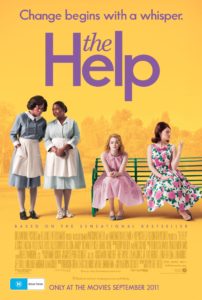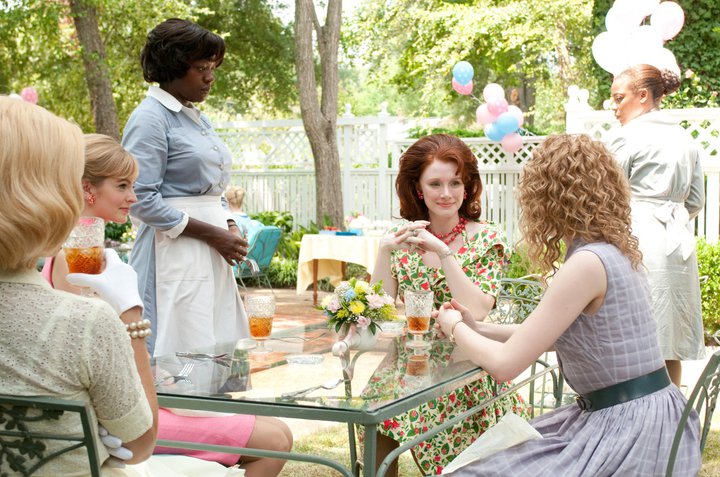 Despite the Emancipation Proclamation of 1863, and the UN Declaration of Human Rights in 1948, institutionalised indenture existed in the southern United States throughout the civil rights movement in the 1960s. In many ways, the African-American population of Mississippi and similarly inclined states were more a part of white society’s lives than the bigots of the day would care to admit. The black “help” were not simply housekeepers, but nannies to the children and as The Help writer/director Tate Taylor would emphasise, de facto mothers to neglected children at the expense of their own families. As the ever-present but invisible members of southern society, their desires were not considered. Based on Kathryn Stockett’s 2009 novel of the same name, The Help attempts to give this marginalised group a voice.
Despite the Emancipation Proclamation of 1863, and the UN Declaration of Human Rights in 1948, institutionalised indenture existed in the southern United States throughout the civil rights movement in the 1960s. In many ways, the African-American population of Mississippi and similarly inclined states were more a part of white society’s lives than the bigots of the day would care to admit. The black “help” were not simply housekeepers, but nannies to the children and as The Help writer/director Tate Taylor would emphasise, de facto mothers to neglected children at the expense of their own families. As the ever-present but invisible members of southern society, their desires were not considered. Based on Kathryn Stockett’s 2009 novel of the same name, The Help attempts to give this marginalised group a voice.
In 1960s Mississippi, Aibileen Clark (Viola Davis, Eat Pray Love) is an African-American maid who has recently lost her son but continues to serve as housemaid and nanny to the rich white family of Elizabeth Leefolt (Ahna O’Reilly). Similarly, Minny Jackson (Octavia Spencer, Dinner for Schmucks) is an outspoken maid who has been repeatedly fired from jobs, but is an excellent baker. When Eugenia “Skeeter” Phelan (Emma Stone, Easy A) returns home from college seeking work as a journalist, she is dissatisfied with the jobs she is able to get, but also the disappearance of her beloved childhood maid. Awakened to the rampant discrimination going on around her, and the vacuous nature of the lives of her friends – including snooty ringleader Hilly Holbrook (Bryce Dallas Howard, Hereafter) – Skeeter determines to write a book from the perspective of “The Help”, and begins to enlist the aid of the maids of the town.
Modern America is certainly not free of the kinds of racial issues that once completely divided a country, with recent events such as Hurricane Katrina revealing the disparity between rich and poor, not to mention black and white, in the Deep South. Mississippi was known for its genuine dangers to those that spoke out against the system, as the 1963 murder of Medgar Evers, referenced in the film, is evidence of. Indeed, much of the criticism levelled at the movie could be the overly uplifting view that the film takes, as it it were Mississipi Burning by way of Oprah Winfrey. Indeed, the film builds to a positive conclusion in 1964, the same year that the infamous murders depicted in Alan Parker’s 1988 film took place. While the film would have us believe that the telling of these stories indelibly change the lives of black people across the great state of Mississippi forever, the real world events that the film runs parallel to are indicative that the south still had a long way to go. Politics aside, if such a thing can be done in a film like this, The Help works best a character piece.
Despite looking shockingly like (a pre-crisis) Lindsay Lohan, Stone brings her characteristic energy to the role of Skeeter, clashing with the local princesses. Howard in particular has fun with her bitchy role, and Sissy Spacek is delightful as Hilly’s soused mother. An almost unrecognisable Jessica Chastain (Take Shelter, The Tree of Life) brings a vibrancy to her role as the singularly upbeat ditz who is the polar opposite of the southern women. Yet it is “The Help” themselves, in particular Davis and Spencer, who carry most of the emotional weight in the film. Through them we experience the highs and lows of their respective lots in life, but also the strongest aspects of the film.
[stextbox id=”custom” caption=”The Reel Bits”]The Help is may not deliver a cutting-edge examination of slavery in modern America, but it does provide a heartwarming character piece set against one of the most important eras in the last century of the United States’ history.[/stextbox]
The Help is released on 1 September 2011 in Australia from Disney.




